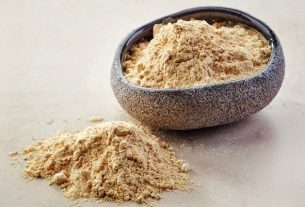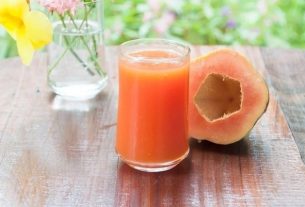Some home remedies, such as lemon juice and honey, ginger syrup with cinnamon or mint tea, contain substances with expectorant, anti-inflammatory, antiseptic and antioxidant action, which help eliminate secretions from the respiratory tract and strengthen the immune system, relieving coughs with phlegm, caused by flu, colds, sinusitis or bronchitis, for example.
To be more effective, these home remedies can be sweetened with honey, as they help to lubricate and reduce throat irritation, and eliminate viruses and bacteria from the body, relieving coughs. However, honey should not be used by children under 2 years of age, or by people who have diabetes or allergies to honey, pollen or propolis.
It is important to note that, although they have benefits, home remedies for coughing with phlegm do not replace treatment recommended by a doctor. Furthermore, pregnant women should opt for inhalations and essential oils that can be applied to the skin, because the use of some teas is contraindicated during pregnancy. See home remedies for coughs that can be used during pregnancy.

Home remedy options
Some home remedy options for coughing with phlegm are:
1. Lemon juice and honey
Lemon juice and honey have an expectorant action as they are rich in vitamin C and antioxidants, which help reduce inflammation of the respiratory tract, relieving coughs and accelerating recovery from colds and flu. Additionally, honey helps lubricate the throat and reduce tissue irritation, relieving coughs.
Ingredients
- 1 lemon juice;
- 1 tablespoon of honey.
- 200 mL of water.
Preparation mode
Blend all the ingredients in a blender and sweeten with honey before drinking immediately after preparation.
Orange, pineapple and watercress juice is rich in vitamins C and A, iron, potassium, and bromelain, which have an expectorant, anti-inflammatory and antioxidant action, which help fight coughs with phlegm and strengthen the immune system, accelerating recovery from flu and colds.
Ingredients
- ½ cup of watercress leaves and stems;
- Juice of 1 orange;
- 1 slice of pineapple.
Preparation mode
Place the ingredients in the blender and blend until you obtain a homogeneous mixture. Drink half a glass of juice 2 to 3 times a day, or whenever a severe coughing attack appears. See other ways to use watercress to combat coughs.
3. Cinnamon ginger syrup
Ginger and cinnamon syrup has a drying effect on mucous membranes and is a natural expectorant, which helps fight coughs with phlegm caused by the flu or colds.
Ingredients
- 1 cinnamon stick or 1 teaspoon of ground cinnamon;
- 1 cup of sliced peeled ginger root;
- 85 g brown, demerara or coconut sugar;
- 100 mL of water.
Preparation mode
Boil the water with the sugar, stirring until the sugar is completely dissolved. Turn off the heat, add the ginger and cinnamon, and stir. Store the syrup in a clean, dry glass bottle. Take 1 teaspoon of ginger syrup 3 times a day.
This syrup should not be used by people with clotting problems or who use anticoagulant medications, as it may increase the risk of bleeding and bruising. Furthermore, the use of this syrup should be avoided by pregnant women if they are close to giving birth or in women with a history of miscarriage, clotting problems or who are at risk of bleeding.
4 Mint tea
Mint tea is rich in menthol, an essential oil that helps improve the symptoms of coughing with phlegm, runny or blocked nose and headache, common in cases of flu or colds.
Furthermore, this tea has antibacterial, antiviral and anti-inflammatory properties, which help the body fight the cold and recover faster.
Ingredients
- 6 chopped mint leaves;
- 150 mL of boiling water.
Preparation mode
Add the mint to the cup of boiling water and let it rest for 5 to 10 minutes. Strain, sweeten with honey if desired and drink 3 to 4 cups a day.
5. Thyme and honey infusion
The infusion of thyme and honey is rich in anti-inflammatory and antiseptic substances, such as thymol, carvacrol, cymene and linalool, which also have an expectorant action, facilitating the elimination of phlegm, in addition to lubricating the throat, relieving coughs, runny nose and the feeling of a stuffy nose.
For people allergic to honey, propolis or pollen, honey should not be added to the infusion, but should only be prepared with thyme.
Ingredients
- 1 tablespoon of dried thyme extract or 2 sprigs of fresh thyme;
- 1 liter of boiling water;
- 1 tablespoon of honey.
Preparation mode
Add the dried thyme to the boiling water and let it rest for 5 to 10 minutes. Strain and drink up to 3 cups per day.
Thyme infusion should not be used by people with stomach problems such as gastritis or ulcers, by people with liver disease or who use anticoagulant medications such as warfarin or clopidogrel, for example.
6. Onion and garlic syrup
The home remedy for coughing with phlegm with onion and garlic has expectorant and antiseptic properties, which in addition to helping to loosen phlegm, strengthen the immune system and reduce lung inflammation, preventing the production of more phlegm.
Ingredients
- 1 medium grated onion;
- 1 clove of crushed garlic;
- Mel.
Preparation mode
Place the onion and garlic in a glass container and add enough honey to cover the onion and garlic. Stir the ingredients and store in the refrigerator overnight. For children over 2 years old, you can give 2.5 mL of syrup, which is equivalent to about half a teaspoon of syrup, up to 3 times a day. For adults, you can take 5 mL or 1 teaspoon of the syrup, up to 3 times a day. Discard any unused amount of this syrup after 1 week. Check out other ways to use garlic to combat coughs.
Because it contains honey, onion and garlic syrup should not be used by children under 2 years of age, pregnant women with gestational diabetes or people who have diabetes, as it can increase the amount of sugar in the blood and make it difficult to control blood sugar levels.
7. Inhalation with eucalyptus steam
A good home remedy for coughing with phlegm is to inhale eucalyptus vapor because it has expectorant and antiseptic properties, which quickly relieve nasal congestion.
However, there are some people who may be more sensitive to the essential oil released by eucalyptus and, in these cases, symptoms may worsen. If this happens, you should avoid doing this inhalation.
Ingredients
- 5 drops of eucalyptus essential oil;
- 1 liter of boiling water.
Preparation mode
Place boiling water in a basin and add drops of eucalyptus essential oil. Then cover your head and basin, inhaling the tea steam. Then, cover your head with an open towel, so that it also covers the container containing the eucalyptus essential oil solution. Tilt your head over the container and inhale the steam as deeply as possible for up to 10 minutes, repeating 2 to 3 times a day. This towel helps keep the solution vapor for longer.
If you don’t have essential oil at home, you can also inhale by dipping some eucalyptus leaves in boiling water, as the plant’s natural oil will be transported by the water vapor. See other ways to use eucalyptus to relieve coughing with phlegm.
8. Licorice tea
Licorice tea, prepared with the medicinal plant Glycyrrhiza glabrais rich in substances such as glycyrrhizin, glabridin, apigenin and liquiritin, with powerful expectorant action, as well as antioxidant, antibacterial and anti-inflammatory properties, which helps combat coughing with phlegm and other respiratory problems such as colds or bronchitis, for example.
Ingredients
- 1 teaspoon of licorice root;
- 1 cup of boiling water;
- Honey to sweeten to taste.
Preparation mode
Add the licorice to the cup of boiling water, cover and let it rest for 10 minutes. Strain and sweeten with honey if desired. Drink this tea up to 2 times a day.
Licorice tea should not be consumed by pregnant or breastfeeding women and by people with heart problems, kidney disease and low blood potassium levels.
9. Guaco and mallow tea
Guaco and malva tea has a calming effect on the bronchi, reducing phlegm production and shortness of breath. Furthermore, the properties of guaco make secretions more liquid, making it easier to remove phlegm stuck in the throat and lungs.
Ingredients
- 1 teaspoon of dried mallow flowers or leaves;
- 1 tablespoon of fresh guaco leaves;
- 1 cup of boiling water.
Preparation mode
Place the mallow and guaco in the cup with boiling water. Cover for about 10 minutes. It is recommended for adults to drink 1 cup of tea, up to 3 times a day. See other recipes with guaco to relieve coughs.
This tea should only be taken from 2 years of age, and water vapor inhalations are recommended for younger children. Check out the main expectorants recommended for babies under 2 years old.
10. Sweet broom tea
Sweet broom tea, prepared with the medicinal plant Scoparia dulcisis rich in fatty acids, diterpenes and flavonoids, with anti-inflammatory, antioxidant, expectorant and antiseptic properties, which help relieve coughs with phlegm, caused by colds, asthma or bronchitis.
Ingredients
- 10 g of sweet broom;
- 500 mL of water.
Preparation mode
Place the broom and water in a container and bring to the boil, letting it boil for 10 minutes. Then let it cool, strain and drink 3 to 4 cups a day.
Sweet broom tea should not be used by pregnant women as it may cause miscarriage. Furthermore, this plant should also not be used while breastfeeding.
11. Echinacea tea
Echinacea tea is rich in antioxidant, anti-inflammatory and immunostimulant substances, such as flavonoids, chicoric and rosmarinic acids, which help to strengthen the immune system, reducing the duration of flu, colds or sinusitis, which helps to relieve coughs with phlegm.
Ingredients
- 1 teaspoon of echinacea root or leaves;
- 1 cup of boiling water.
Preparation mode
Place 1 teaspoon of echinacea root or leaves in a cup of boiling water. Let it rest for 15 minutes, strain and drink twice a day.
Echinacea tea should not be used by children, pregnant or breastfeeding women, or by people who have asthma, tuberculosis or autoimmune diseases such as rheumatoid arthritis, lupus or psoriasis.
To complement these home remedies, it is recommended to drink plenty of water to help thin thicker secretions, which helps combat coughing with phlegm. Also discover other home remedies to eliminate phlegm.

Sign up for our newsletter and stay up to date with exclusive news
that can transform your routine!
Warning: Undefined array key "title" in /home/storelat/public_html/wp-content/plugins/link-whisper-premium/templates/frontend/related-posts.php on line 12
Warning: Undefined array key "title_tag" in /home/storelat/public_html/wp-content/plugins/link-whisper-premium/templates/frontend/related-posts.php on line 13



